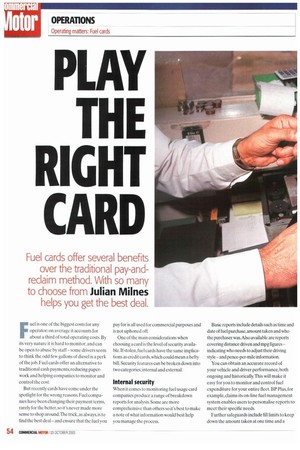PLAY THE RIGHT CARD
Page 54

Page 55

If you've noticed an error in this article please click here to report it so we can fix it.
Fuel cards offer several benefits over the traditional pay-and reclaim method. VVith so many to choose from Julian MilInes helps you get the best deal.
Fuel is one of the biggest costs for any operator; on average it accounts for about a third of total operating costs. By its very nature it is hard to monitor, and can be open to abuse by staff — some drivers seem to think the odd few gallons of diesel is a perk of the job. Fuel cards offer an alternative to traditional cash payments, reducing paperwork and helping companies to monitor and control the cost.
But recently cards have come under the spotlight for the wrong reasons. Fuel companies have been changing their payment terms, rarely for the better, so it's never made more sense to shop around.The trick, as always, is to find the best deal — and ensure that the fuel you pay for is all used for commercial purposes and is not siphoned off One of the main considerations when choosing a card is the level of security available. If stolen, fuel cards have the same implications as credit cards,which could mean a hefty bill. Security features can be broken down into two categories; internal and external.
Internal security
When it comes to monitoring fuel usage card companies produce a range of breakdown reports for analysis. Some are more comprehensive than others so it's best to make a note of what information would best help you manage the process. Basic reports include details such as time and date of fuel purchase,amount taken and who the purchaser was.Also available are reports covering distance driven and mpg figures — indicating who needs to adjust their driving style—and pence-per-mile information.
You can obtain an accurate record of your vehicle and driver performance, both ongoing and historically. This will make it easy for you to monitor and control fuel expenditure for your entire fleet. BP Plus, for example. claims its on-line fuel management system enables users to personalise reports to meet their specific needs.
Further safeguards include fill limits to keep down the amount taken at one time and a locking facility that stops the card being used after a specified time in the day. There are also warning reports to let managers know of any adverse drawings.And purchases can be limited to just diesel if required.
External security
If the card falls into the wrong hands there are safeguards available to minimise the impact. especially if your drivers travel abroad where cab theft may be more frequent.To make life harder for card thieves some companies,such as DKV Euro Service, provide a PIN facility .which works in the same way as a cash card.'The attendant will pass the cardholder a keypad to activate the card before the fuel transaction is processed.
Further measures include AllStar's Online Authorisation, which captures data at the time of sale. If the card has been hot-listed the fuel purchase is blocked, It can also determine suspicious activities, such as the same fuel card being used in two different locations at the same time.
The number of outlets available to each card issuer is mainly dictated by how the fuel is sourced. The suppliers include major retailers and independent refiners.
Major retailers
These include companies such as Esso. Shell and Total. Generally, they will only promote their card to be used at their own branded sites. Sometimes the major's 'share' sites.This means a customer from, for example Esso. will be able to draw fuel from a Shell site.
Some of these retailers offer more than one type of card. Some may charge the amount stated at the forecourt, while others may charge the pump price less, for example, lp/lit. Another arrangement is to give a weekly price based on the market movement over the preceding week.
Independent refiners
Other card companies such as Petroplus have their own fuel refineries and sell the product through networks such as Keyfuels, which negotiates with independent forecourts to stock the fuel.The use of fuel networks varies from card to card. Petroplus's Route-mate card is the only one to offer access to the Keyfuels. Securicor and UK fuels networks.
These types of companies tend to review prices on a weekly basis based on the current market and the anticipated movement in the coming week.
The bottom line
Overall, it's advisable to shop around. Each company offers a different number of sites s makes sense to investigate which one best si your needs.
Some companies may be open to negotia tion. If you're running another card that offi a preferential rate at the time it can't hurt to see who'll match that price. U.
































































































































































































